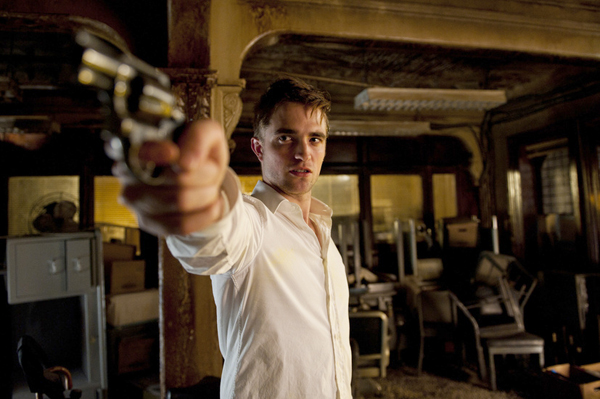
Robert Pattinson in COSMOPOLIS (Caitlin Cronenberg/Entertainment One)
I almost always fall into the “what I see is what I can work with” camp when it comes to book adaptations, and it can be tricky when it comes to films by master auteurs who pride themselves on their vision as much (or if not more) than the original text. I haven’t read Don DeLillo’s Cosmopolis, and I’m not sure if I intend to at any time soon, despite DeLillo having a fairly massive reputation.
The protagonist would probably be considered a villain: Eric Packer (Robert Pattinson), a Wall Street monarch of some kind. It’s implied he’s got knowledge and math up the wazoo, though we don’t really know what he does for a living aside from listening to other people talk about money while stranded in traffic (with Jay Baruchel, Samantha Morton, and art dealer Juliette Binoche, with whom he quickly has sex before their their financial-talk patter), all of whom leave little impression. Guess that’s part of the point.
Packer has one goal in mind for the day: to get a haircut. Why does he need a haircut? Metaphor, perhaps. (Why does he need more money? Or, what is he doing to fill the completely abysmal space that must be his soul?) We don’t know. And really, there’s no point in caring after a while. Cosmopolis drowns in dialog about money and commerce, sexual relationships, and about people dying. A rapper, at one point, is shown to have died of natural causes and it inspires a moment of grief—but what does this matter? On to the next point of the trip. The dialog is meant to be so pointed, so loaded with meaning, and also funny in a super black-comedic way that Cronenberg has been so successful at for decades. (One amusing moment concerns a dead rat replacing a country’s currency.)
Overall, it just falls flat. The movie’s about an empty person, surrounding himself in his space station of a limousine (notice the lack of ambient sound) that he shares with other vacuous people, but the it’s just too preachy for its own good. We all know about the financial collapse, we know about the 99% vs. the 1% in the Occupy Wall Street movement. But I wanted to be engaged by this emptiness, and it just didn’t feel authentic in any way. The artificial conversations just drag the film down. (And I was too busy noticing the backdrop of anarchism outside the limo to listen to what Morton’s financial theologian was saying.)
Pattinson, to his credit, plays it as straight as he can, as a man coming apart inside more and more (the sorta plotline has Packer losing millions due to some currency crashing). We see little flinches and kinks in Packer’s armor, and Pattinson plays that and his uptight nature well—better than expected from his stolid work in Twilight and the little-seen Little Ashes.
Much better in his sadly short screen time is Paul Giamatti, who appears in the sort-of climax as a disgruntled ex-financial analyst for Packer (who Packer, of course, doesn’t know). Suddenly, in the last reel, Cosmopolis comes alive in a believable way and the philosophy that the two characters share makes it compelling: they discuss things that matter. If only Giamatti had a bigger role—hell, if the film had been about that conflict between them—it might have really been a more captivating ride.
Cronenberg still has a strong sense of place (the limo is a cold, clinical marvel, albeit the green screen is noticeable) and composition. The problem is the script. I couldn’t wait to get away from these people, and not in the way that the filmmakers intended. Unlike in American Psycho, where it’s about the cold psychotic world of big money, Cosmopolis is about this 1%-er, with whom I had zero interest, even as a figure of satire. That the film seems sort of self-satisfied with its listlessness makes it all the more frustrating.






Leave A Comment